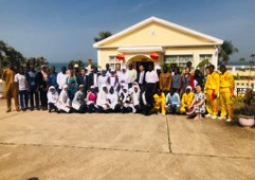
The National Environment Agency on Tuesday 30 July 2024 joined the rest of the world in commemorating World Environment Day.
The Word Environment Day (WED) was first celebrated under the theme: "Only One Earth". Since then it has been celebrated annually on 5th June and various activities for awareness and protection of the Environment are carried out.
This year's theme was on “land restoration, desertification, and drought resilience”.
Speaking at the commemoration at the National
Environment Agency complex, Rohey John Manjang, minister for Environment and Natural Resources, emphasised the importance of this year’s theme, saying there was a need to address some of the most pressing environmental challenges.
The environment minister explained the importance of land management, adding: “Our land is not merely a physical space; it is the foundation of our sustenance, our economic activities, and our cultural heritage.”
However, she pointed out the challenges human activities and climate change have brought about that have led to the degradation of resources, causing desertification and increasing the frequency and severity of droughts.
Those challenges, the Minister noted, threaten food security, livelihoods, and the existence of some of their communities.
She also pointed out that the government, in collaboration with various stakeholders, had undertaken “significant initiatives” to combat land degradation and promote sustainable land management practices.
Dr Dawda Badjie, executive director of NEA, said NEA and its partners would continue to take solid steps in addressing pertinent environmental issues such as waste management in collaboration with local municipalities and Area Councils.
Dr Badjie said land, natural resources degradation, and desertification have been a threat to the continent's livelihood and development chain, which calls for urgent sustainable land management.
The threats constituted the main challenges of the twenty-first century, and called for a committed and holistic approach, he said, calling on all and sundry: “I challenge all Gambians to plant and grow as many trees as they can protect.”
Abubakar Kujabi, project coordinator of the Global Climate Change Alliance (GCCA+), in his remarks, said the Gambia had benefited from EU funding through the project and sought to help coastal communities adapt to the impact of climate change.
Of their project's activities, he said one was in line with this year's theme of World Environment Day, which is coastal greening through an ecosystem-based approach.
The activity was expected to restore and enhance ecosystems, to protect coastal communities against the negative impacts of climate change, Mr Kujabi said.





